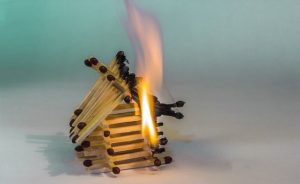Most Americans know a thing or two about fire safety. We’ve all learned to stop, drop, and roll. We should know not to use water to put out gas fires. Many people have learned how to use fire extinguishers, even if they’ve never actually had to. Still, it is alarming just how pervasive some fire safety myths tend to be. As fire protection experts, it is our duty to try to dispel some of these misconceptions. Don’t fall victim to these fire safety myths!

Don’t fall victim to these fire safety myths!
People Will Panic During Fires
On a surface level, it makes sense that most people will panic in the event of a fire. When people are panicked, they have a tendency to act irrationally. But research has shown that panic during a fire is actually relatively atypical. This can come as a great relief to individuals who work in commercial settings. Still, you should keep in mind that regularly practicing evacuations is key to mitigating widespread alarm in the event of an actual fire. As long as people know what to do, it is unlikely that they will panic.
Fire Alarms Go Off Before a Fire
This is one of the biggest offenders on our list. Many people are under the impression that when a fire alarm sounds, it’s because of smoke, and a fire has not started yet. While it’s true that some detectors may be able to detect a fire before it has truly broken out, you should always assume that, if an alarm has gone off, then the fire has started. If your smoke alarm goes off, err on the side of caution, and expect the worst.
Non-Residential Fires are Deadlier than House Fires
You may have heard before that fewer people die in house fires than in non-residential fires. This is far from the truth. According to the NFPA, 2,870 Americans lost their lives in residential fires during 2019. By contrast, 110 perished in other building fires. The difference here is not negligible. It’s difficult to trace the origin of this misconception. Perhaps people think residential fires are not so deadly because we have only practiced fire drills in schools and offices. Maybe if we did so at home, residential fires would claim fewer lives annually.
Flames Are the Main Threat
Some people are under the impression that the biggest threat in the event of a fire is, well, fire. You might want to reconsider this conception. In fact, the inhalation of toxic smoke is responsible for more deaths annually than the fire itself. Just because the fire doesn’t burn you does not mean it can’t seriously hurt or even kill you. You may feel that you are in a room that isn’t burning, you are safe. But you should always place a priority on evacuation. And remember: smoke and gas rise, so getting on your hands and knees can be a good way to reduce inhalation.
Commercial and Residential Fire Prevention from Judd Fire Protection
If you want to ensure your home and business are safe throughout the year, trust Judd Fire Protection, LLC. We have over two decades of experience designing, installing, inspecting, and repairing residential and commercial fire protection systems. We serve clients throughout Maryland, Pennsylvania, Washington, D.C., Virginia, and West Virginia. If you are interested in finding out more about our services and protecting your home and business, give us a call at 410-871-3480 or contact us online. For more fire safety tips, follow us on Facebook, Twitter, and Pinterest.
